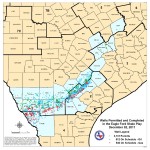Will Texas Taxes Pay for Damaged Counties in Eagle Ford?

Dave Fehling/StateImpact
Poster at DUG Eagle Ford convention in San Antonio
Hearing some officials talk about the oil boom in South Texas, you’d think the streets were paved with gold.
Yet the reality is the pavement is almost gone in some spots, ripped up by thousands of heavy trucks servicing oil drilling rigs. Some county leaders say the millions of tax dollars that could help fix the damage has all gone to Austin. And now they’re fighting to reroute it back to where they say it’s sorely needed.
Oil Severance Tax Surges
Texas state officials love to brag about how well their state’s economy is doing, and nowhere is that more evident than in the Eagle Ford Shale, the underground rock formation in South Texas. Hydraulic fracturing (fracking) and thousands of new wells are behind a surge in oil production.
As much crude is now being pumped out of South Texas in a single day — some 300,000 barrels –as was pumped in all 2009, according to David Porter, one of three elected officials of the Texas Railroad Commission.

Dave Fehling/StateImpact Texas
David Porter told drillers that the oil severance tax revenue last fiscal year was a $1 billion more than expected
“The growth is phenomenal.”
Statewide, oil production has meant an increase in the amount of the severance tax levied on the oil produced. Collections are up 43% this past fiscal year, totaling some $2.1 billion, according to the Texas comptrollers office.
Locally, sales taxes have soared in Karnes County — now the state’s number one producer of crude — with monthly increases as much as four times larger than the previous year.
Where Did All the Tax Money Go?
But despite the new tax revenue, DeWitt County Judge Daryl Fowler is worried about finding enough money to keep his county running and the political implications of having to charge property owners to pay for it.

Dave Fehling/StateImpact Texas
Judge Daryl Fowler says road damage is totaling $30 million a year in DeWitt County
Judge Fowler says the tremendous increase in traffic means the county is now having to spend more on things like courts and county personnel. He says that means that despite the seeming inflow of new tax wealth, county leaders have nonetheless had to let property taxes go up. The judge says he and county commissioners have had to “suffer political persecution because of that.”
But what about all that state severance tax? Fowler says the tax on the oil pumped from under the county totaled $57.5 million in 2011. Trouble is, it’s a state tax, so it all went to Austin.
“DeWitt County gets zero dollars,” says the judge. “The tax is yielding tremendous benefits for the State of Texas, but we’re being left with untold damages from the production activity.”
What Will Texas Lawmakers Do?
Judge Fowler is spearheading an effort to convince lawmakers to figure a way to send some of that revenue back to the counties in South Texas. A good bit of the Eagle Ford Shale is in the district of State Senator Judith Zaffirini, a Democrat from Laredo.

Dave Fehling/StateImpact Texas
Statewide damage to roads from oil and gas production vehicles could be $2 billion annually
“At this point, all possible funding options are on the table, including using some of the increased severance tax revenues and impact fees,” she wrote in an email to StateImpact.
The Eagle Shale Task Force is the forum created to provide a forum to hash out such issues and will make recommendations by year’s end to the legislature. It was formed by David Porter, the Texas Railroad Commission member.
Asked by StateImpact if he detected much sympathy from lawmakers for the plight of the affected counties, Porter said, sure there’s sympathy, but “how much sympathy is going to translate into hard dollars? I can’t totally predict that.”

